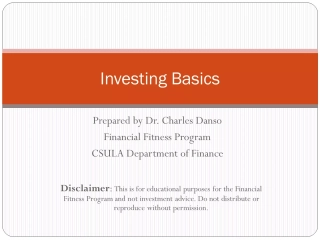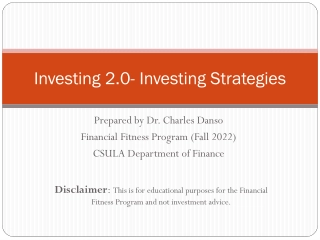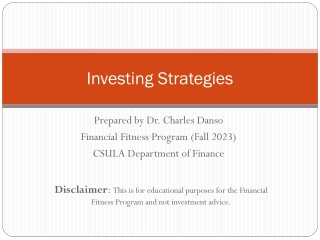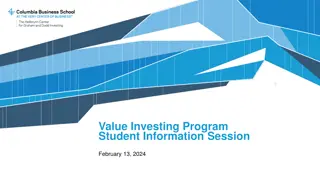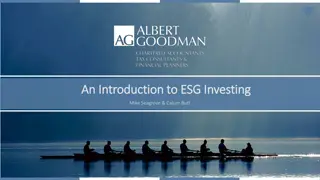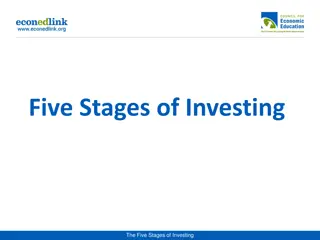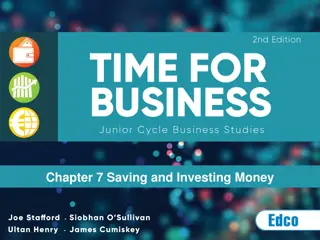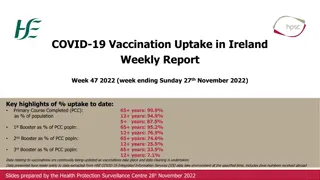Investing 18-Week Course Overview
Learn the basics of investing in this 18-week course outline. Understand different investment types like stocks, mutual funds, and bonds, along with associated risks. Discover how to research companies, set financial goals, and build an investment portfolio. Protect yourself from financial scams and grasp key investment terminology such as stocks, dividends, preferred stocks, and ticker symbols.
Download Presentation

Please find below an Image/Link to download the presentation.
The content on the website is provided AS IS for your information and personal use only. It may not be sold, licensed, or shared on other websites without obtaining consent from the author.If you encounter any issues during the download, it is possible that the publisher has removed the file from their server.
You are allowed to download the files provided on this website for personal or commercial use, subject to the condition that they are used lawfully. All files are the property of their respective owners.
The content on the website is provided AS IS for your information and personal use only. It may not be sold, licensed, or shared on other websites without obtaining consent from the author.
E N D
Presentation Transcript
Investing 18 Week Course Outline
Overview In this lesson we will be learning about the basics of investing. We will learn about different types of investments such as stocks, mutual funds and bonds. We will assess the different risks that come with each type of investment and determine when it is a good idea to invest. We will learn the importance of researching companies and investing based on what we know. We will learn how to identify our financial goals and how to create an investment portfolio that works toward them.
Unit Understand the basics of how to grow wealth Objectives Identify various scams Understand the importance of not falling victim to a scam Protect yourself from financial scams
Unit 2.1 - Intro to Investing 18 Week Course Outline
Key Terminology What is a Stock?
Key Terminology A Stock is... A share (or percentage) of ownership in a company, which includes partial ownership of a company s assets and profits.
Key Terminology What is a Dividend?
Key Terminology A Dividend is... The distribution of some of a company s profits, usually paid quarterly.
Key Terminology What is a Preferred Stock?
Key Terminology A Preferred Stock is... These stockholders have a higher claim to dividends than common stockholders, and usually do not have voting rights. Whereas Common Stock gives a shareholder one vote for every share owned at shareholder meetings. Common stockholders may also be entitled to dividend payments.
Key Terminology What is a Ticker Symbol?
Key Terminology A Ticker Symbol is... A unique one to five letter code used by the stock exchanges to identify a company.
Up Next! What is a Stock?
Challenge Questions What is a Stock? Why do people choose to invest their money? What is a Stock? (personalfinancelab.com) What is a Ticker Symbol? (personalfinancelab.com) Why Invest in Stocks? (personalfinancelab.com)
Challenge Questions What is a Stock? What do you need to consider before investing your money in the stock market, or any other type of investment? What is a Stock? (personalfinancelab.com) What is a Ticker Symbol? (personalfinancelab.com) Why Invest in Stocks? (personalfinancelab.com)
Challenge Questions What is a Stock? What is risk? How is investing different from gambling? What is a Stock? (personalfinancelab.com) What is a Ticker Symbol? (personalfinancelab.com) Why Invest in Stocks? (personalfinancelab.com)
Challenge Questions What is a Stock? What are your financial goals, and how do you intend to achieve them? What is a Stock? (personalfinancelab.com) What is a Ticker Symbol? (personalfinancelab.com) Why Invest in Stocks? (personalfinancelab.com)
Challenge Questions Why Invest in Stocks? Why do people invest their money in the stock market? What is a Stock? (personalfinancelab.com) What is a Ticker Symbol? (personalfinancelab.com) Why Invest in Stocks? (personalfinancelab.com)
Up Next! Class Activity Watch Tutorial Videos
Up Next! Class Activity First Trades in the Stock Game
Homework Investing 101 Chapter 1: Introduction to Investing
Unit 2.2 - How the Stock Market Works 18 Week Course Outline
Key Terminology What is a Stock Exchange?
Key Terminology A Stock Exchange is... A market in which securities (stocks, ETFs etc.) are bought and sold. The New York Stock Exchange (NYSE), the largest stock exchange in the world.
Key Terminology What is Inflation?
Key Terminology Inflation is... The increase in prices and fall in the purchasing value of money.
Key Terminology What does CPI stand for?
Key Terminology CPI is... The Consumer Price Index is the most basic way to measure inflation, where economists set a basket of goods and compare their prices between years.
Key Terminology What is the GDP?
Key Terminology GDP is... The Gross Domestic Product is the total value of goods produced and services provided in a country during one year.
Up Next! What is the New York Stock Exchange?
Challenge Questions What is the New York Stock Exchange? Define what a stock is. What is the New York Stock Exchange? (personalfinancelab.com) Inflation (personalfinancelab.com)
Challenge Questions What is the New York Stock Exchange? What role do brokerage firms play in the stock market? What is the New York Stock Exchange? (personalfinancelab.com) Inflation (personalfinancelab.com)
Challenge Questions What is the New York Stock Exchange? What is a publicly traded company? What is the New York Stock Exchange? (personalfinancelab.com) Inflation (personalfinancelab.com)
Challenge Questions What is the New York Stock Exchange? Why do companies choose to go public? What is the New York Stock Exchange? (personalfinancelab.com) Inflation (personalfinancelab.com)
Challenge Questions Inflation Describe in your own words the difference between inflation and deflation What is the New York Stock Exchange? (personalfinancelab.com) Inflation (personalfinancelab.com)
Up Next! Class Activity Group Work
Homework Investing 101 Chapter 2: How The Stock Market Works and Why It Works & Chapter 3: Making Your First Trade Play Budget Game
Unit 2.3 - How to Research Stocks 18 Week Course Outline
Key Terminology What is a Stock Quote?
Key Terminology A Stock Quote... Provides the essential information about a particular stock at a point in time, and may include the name of the company, the ticker symbol, the price, the day s high and low prices, and the trading volume.
Key Terminology What is a Bid/Ask Price?
Key Terminology A Bid/Ask Price is... How much buyers and sellers in the real market are willing to pay for this stock. The Bid Price is the highest price a buyer is willing to pay for the stock. The Ask Price is the lowest price a seller is willing to sell the stock.
Key Terminology What is Dividend Yield?
Key Terminology Dividend Yield is... The percentage of the stock s price that is paid out in dividends per year.
Up Next! Getting (and Understanding) Stock Quotes
Challenge Questions Getting (and Understanding) Stock Quotes Why is it important to research a company before investing in their stocks? Getting (and understanding) Stock Quotes (personalfinancelab.com) Getting Trading Ideas (personalfinancelab.com)
Challenge Questions Getting (and Understanding) Stock Quotes What would you check to make your selection is a good buy? Getting (and understanding) Stock Quotes (personalfinancelab.com) Getting Trading Ideas (personalfinancelab.com)
Challenge Questions Getting (and Understanding) Stock Quotes Why should you always do your own research? Getting (and understanding) Stock Quotes (personalfinancelab.com) Getting Trading Ideas (personalfinancelab.com)
Challenge Questions Getting (and Understanding) Stock Quotes Why should you consider your financial goals when researching your stocks? Getting (and understanding) Stock Quotes (personalfinancelab.com) Getting Trading Ideas (personalfinancelab.com)


